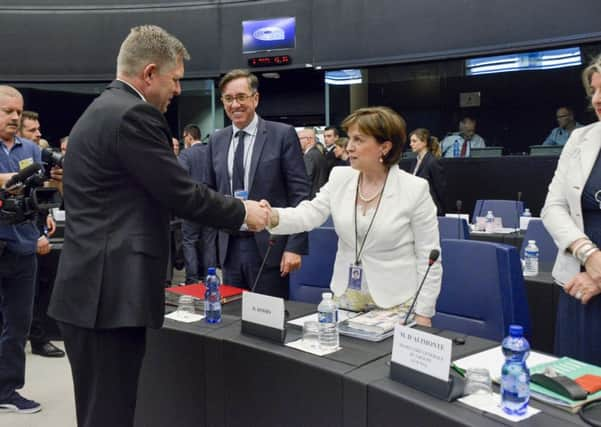Let's get on with the job in hand - Dodds


Since over 17 million people voted in favour of leaving the European Union two weeks ago, our country has been exposed to some unhelpful, hysterical reactions on the potential impact of our exit.
Many commentators - and some within the agriculture sector - have failed to show balance toward the outcome. Whether this is because they have a bias to remain, I do not know however given the nature of the result it is clear that they are not reflective of many of their readers. Instead, what we need at this time is a level-headed awareness of where we are and where we are going. Farmers will have pressing questions that require fair and clear answers, and I want to ensure that this happens during what will be ongoing negotiations in the days ahead.
We are still in Europe
Advertisement
Hide AdAdvertisement
Hide AdI would reassure farmers that nothing has changed since 24 June. We are not in a vacuum and it is business as usual for our farmers. The UK is still a full member of the EU until we officially exit the EU. As part of this, farmers will be entitled to their current payments but will have to adhere to all existing EU legislation. There will also be no impact on access to the single market. This is a market from which the UK imports approximately 18 billion pounds worth of food every year, highlighting the importance of the UK in European trade context.
Negotiations to come
It is also important to stress to farmers that we have time on our side. There is no prospect of a black hole. It is likely that a new Prime Minister will be elected at the beginning of September, and whilst the decision of the people must be respected, it is likely that the Government will form a negotiating position before invoking Article 50. Only the UK can invoke this and the negotiation has two years to reach a conclusion. We must not panic. There is an important role for the DUP to play at all levels in this process - to ensure that we get the best possible deal for Northern Ireland. I know that the Agriculture Minister, Michelle McIlveen has already met with industry stakeholders as part of an ongoing process to take cognisance of the needs of the industry. I have already untaken a job of work to liaise with the relevant bodies in the European Parliament to ensure Northern Ireland’s voice is heard.
Exchange rate changes nothing new
It is also worth mentioning that exchange rate fluctuations are nothing new. The UK and agriculture in particular have been able to adjust before and will do so into the future. A lower sterling makes UK exports more competitive, and the current rate makes British products some 10% cheaper on the global market. Stronger exports and a reduction in imports will help stimulate the UK economy. We have already seen a marked increase in lambs exported to the Republic of Ireland. It is interesting that some Member States are calling for an exchange rate fund to deal with the impact of a weaker Sterling. Yet I did not hear many calling for the same when a stronger Sterling was to our disadvantage. On a positive note, the value of the Basic Payment Scheme is also likely to increase.
If anything the referendum result has encouraged the Government to redouble its efforts on competitiveness. The Treasury has already suggested lowing taxes which will help maintain the attractiveness of the UK as one of the most dominant countries for attracting foreign direct investment. The Bank of England is likely to lower interest rates, which will increase credit flows. The ability to implement these measures is the envy of the Eurozone countries, for which the latest prediction is future bail outs for Greece and Italy. The future therefore is bright.
Grasping opportunities
Advertisement
Hide AdAdvertisement
Hide AdUltimately, being realistic about our current position and negotiations to come gives us a steady footing to look forward to the opportunities that an independent UK brings. There will be opportunities to devise our own agriculture policy to suit our needs - opening up new markets and branding Northern Ireland produce for a global audience. With the competitiveness of sterling, let us maximise the benefits of selling our products in the UK and strengthen our position on the global market. Agriculture output and efficiency has suffered under the EU because of a lack of focused research and development, and this should be a focus of the Government going forward.
It has been said many times that people do not like change, or the uncertainty it can bring. I understand that. However, it should not mean we jump to the default position of ‘it’s all terrible.’ Now is a time for cool heads. The people have spoken and we should respect their decision and get on with the job in hand. Unfortunately there are those within the industry that will blame Brexit for every ill-wind which blows our way over the next number of months; however I have every confidence that farmers can ascertain if that is actually the reality.
Back in 1992, the UK witnessed an exchange rate mechanism crisis. The result over time was a stronger UK and indeed it was probably one of the main reasons we did not join the Euro, another failing EU project.
Now is a time for cool heads and getting on with the job in hand.